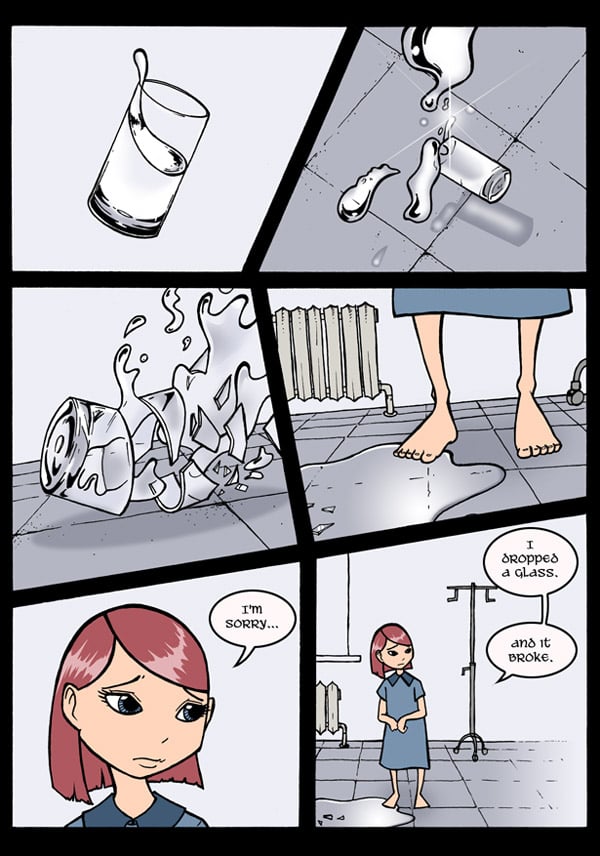A couple weeks ago, PEG replied to my post on objections to universalism with a post of his own titled “Struggling With Apocatastasis.” In my original post, I wasn’t affirming universal salvation, but replying to a common attempt to prove it impossible or unjust. In his reply, PEG raised another objection that I’d like to take a crack at. (I’m excerpting pretty briefly, so go check the whole thing).
I think Leah is looking at human freedom only through the lens of choice… I think there is another dimension of freedom which is not so easily captured by the lens of choice, which is having your actions carry consequences. Forgive me for jumping on my hobby horses all the time, but one key component of Montessori education is that children must use breakable objects. Glasses in Montessori classrooms are made of, well, glass, not plastic. So that if a child drops it and breaks it she sees and experiences, in the most concrete way, that her actions have consequences. And then the child has to clean it up. Montessori (and Montessori, remember, is applied Catholic anthropology) is all about education to freedom, and part of that freedom is recognizing that actions have consequences. Think of a toddler with an unbreakable plastic sippy cup. The toddler drops the cup, which bounces off the floor harmlessly. The nearby parent, a bit harried, reflexively sighs, maybe hisses a reproach to the child, picks up the sippy cup and shoves it back in the child’s hands. At no point in that sequence was the child in control of anything. The child is being taught that her actions have no consequences–the sippy cup was dropped and then magically reappeared in her hand; she is told not to drop things but there are no (intrinsic) negative consequences if she does–and she is reproached for behaving in the way that she is clearly expected to, i.e. irresponsibly (in the most literal sense: without responsibility). NB: I have done the thing I am criticizing here many times; nobody is perfect.
…If there’s one thing the Bible says about this world, it’s that it is really really important. The world is not an illusion to be transcended, nor is it a prison to be escaped from. The Heavenly Jerusalem will not be some other reality, but this reality, albeit healed and divinized. And not only that, but men have a key role in bringing about the Heavenly Jerusalem and in building it in anticipation of the great Revelation.
…To say that all–not most, but all–who die having willfully and knowledgeably and unrepentantly committed very grave sins and refused God’s grace will nonetheless receive it in the afterlife is ultimately to say that our actions here in this world have no consequences.
There’s a phrase I really like, that a recapper for BSG used to use all the time, that asserted fixed is not unbroken. When I accidentally closed a Swiss army knife on my finger during a production of Romeo and Juliet, the nice doctor in the ER gave me three stitches, and I healed, and I have full use of my finger, but I’ve got a scar now. And it hurt in the moment, regardless of whether it was going to feel better later.
In fact, even the process of healing was hard, since I had been really sickened by the sight of so much blood and the fear I’d irreparably damaged my finger that I couldn’t look at the stitches without getting queasy. (I was actually so unhappy about it that I couldn’t look at the bandage without visualizing the stitches, as though I had x-ray specs, and then getting nauseated).
When I harm someone else in my day to day life, regardless of whether God’s grace will ultimately heal me and/or them, that harm is real. In PEG’s example, the teacher who substitutes plastic cups prevents anything from being damaged, and that’s more analogous to the solicitous counterfactual physics I’ve previously discussed in reply to the Problem of Evil than universal salvation.
A closer analogy would have been if the teacher let the students break cups, but then showed them how to fix them, and made sure the student understood that the repaired cup would differ from the old one. After all, when we hurt others, we don’t usually just get to apologize and then go on as before. Our wrongs create new triggers, vulnerabilities, and calluses in our victims, and our relationship changes slightly in order to avoid straining the places where it healed.
Even if I sin against someone and make full amends later, I still robbed both of us of a period of days, weeks, months, etc when we could have been in fellowship, but for my action. There may even be downstream sins that I helped cause by wounding a friend or harming a stranger. Eventually we’d all be united in love, but it’s still a wrench to know we missed out on the chance to delight in each other for so long.
The chance of a final homecoming, when all prodigals run back with joy and humility, doesn’t rob the intervening time of consequences. Even if moral entropy is destined to lose, I don’t want to have slowed its defeat.

















